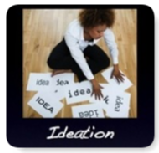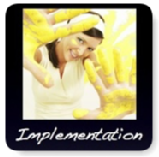Key learning actions – some examples
As part of my project to develop a more systematic and creative methodology for learning technology support, I am using the concept of "key learning actions". They are well-defined, demonstrable actions that may be observed in student behaviour, and which significantly contribute to and enable student success.
It should be possible, for each action, to investigate how they are being achieved by students across different contexts, and to quantify success. We can consider if technology (and its use) is enabling or hindering performance. We can identify actions undertaken by other actors (teachers, administrators) that impact on success. We can then optimise or re-design the technology-enhanced practice and the services (people, hardware, software) that are used. These improvements can be undertaken with a clear sense of how to measure the impact of changes.
We can also use the key actions to evaluate technologies - for example, asking how a specific VLE might enhance success with each action (and producing a SWOT analysis). In some cases this will be directly afforded (or constrained) by the technology itself. In other cases, we must consider the technology and the way in which it is used.
My list of key actions will be developed through a widespread conversation over the coming term. Here are some examples to provide a starting point:
1. Effective admin: understanding, feeling confident about, trusting in and effectively using academic-administrative processes (e.g. assignment management).
2. Feed-forwards using feedback: improving essay performance by using feedback on previous essays (feed forwards).
3. Engaging with research: engaging with the current research activities of the academic department.
4. Developing academic identity: developing personal academic interests and specialisms within the academic context of the course.
5. Project work: successfully designing, managing and completing an academic project, using a variety of appropriate resources and methods, combining distinct activities and phases.
6. Academic writing: writing a good academic text within the parameters, styles and values of the department, course and module.
7. Making academia relevant to me: understanding how academic experiences are relevant to and can be used to further future career goals.
8. Collecting and using experiences: recording rich information and experiences from the wide range of sources encountered, including live personal experiences; organising recordings, reflecting on them, using them to enhance academic work.
9. Understanding assessment: understanding the assessment regime for the course and individual modules.
10. Writing with sources: using academic sources when creating personal, original texts, with correct citation methods and avoiding plagiarism.
11. Choosing modules: choose the most appropriate optional modules to undertake.
12. Academic sources: finding and using a good range of suitable academic texts (and other media).
13. Inspiring discourse: using digital media to spark discourse (in seminars etc).
14. Building to think: prototyping and testing ideas.
15. Telling a story: creating and communicating a narrative.
16. Reflecting: representing, thinking about and planning my own development.
17. Knowing people and resources that I can use: finding out about and accessing the available resources.
18. Identifying and developing a career.
19. Using data: recording, organising, analysing data (text, numerical etc).
20. Accessing teaching: getting access to lectures etc regardless of barriers (e.g. disability, physical location)
My strategy then is to identify a small number of priority actions (most important or those most in need of enhancement), investigate them, work out how technology might help, and make a plan for change (might be a matter of user education, or might mean a formal projet to change a service or to create a new service). Key Action 1 (academic-administrative processes) is already being addressed in a significant way by the Assignment Management project.
 Robert O'Toole
Robert O'Toole





Add a comment
You are not allowed to comment on this entry as it has restricted commenting permissions.